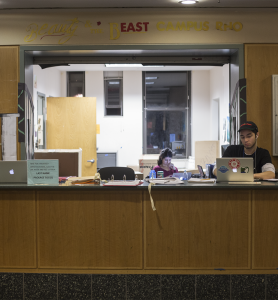
The university is considering centralizing all mail services in Leavey Center as part of the 2017 campus plan.
The university is considering consolidating all mail services to one central location in the Leavey Center beginning in fall 2016 as part of Georgetown’s 2017 campus plan, a proposal that has come under scrutiny from on-campus student workers.
Under the proposal, packages for students would be held and distributed from a single office that may also provide printing services and a new mailbox system.
According to Senior Director for Strategic Communications Rachel Pugh, the university has assembled a committee composed of students and administrators to evaluate the pros and cons of such a system, which has been discussed since 2014. “Benefits of this model include efficiency, streamlined services, better use of the limited space on campus, improved customer service and more utilization of technology, all of which are the best practices that we’ve seen utilized at peer institutions,” Pugh wrote in an email to The Hoya. Another possible benefit of the proposed system includes the reduction of mail trucks and vehicles driving through campus to drop off packages at each RHO, decreasing overall traffic and congestion.
Associate Vice President of Auxiliary Services Joelle Wiese, who has led the conversation over mail consolidation since 2014, said she is unable to comment on the topic until March.
As the university continues the planning process for this system, the administration has faced criticism for its lack of communication with students regarding the future plan.
Georgetown University Student Association Secretary of Campus Planning Ari Goldstein (COL ’18) argued students who work within the current RHO offices need to be better informed on the plans. Without proper communication from the administration, students are left not knowing their future as workers in the current mail system. “There’s been a real lack of transparency from the administration throughout this conversation, which has been frustrating for students who have a significant stake in the issue,” Goldstein said. “The conversation has shifted from ‘this is a possibility’ to ‘this is a plan’ without any real details or deadlines having been provided.”
Goldstein also claimed the drawbacks of centralized mail outweigh the benefits. These drawbacks include longer lines and poorer service, especially during textbook season, lack of accessibility for physically disabled students and job losses for several student employees, many of whom are employed through federal work-study programs.
“The proposal has merit, but until we hear really specific answers to the concerns that I mentioned, I can’t lend support to it,” Goldstein said. “The student worker, accessibility and service issues present much larger concerns than centralized mail presents excitement.”
GUSA Secretary for Residential Living Connor Maytnier (COL ’17), who is also a member of the mail committee, said the conversation on a centralized system is still ongoing, but has yet to produce any finalized goals.
“As far as my involvement with it and where we left it, it was clear that they were very interested in exploring it and in moving us to that system, but at every step of the way there were real concerns related to the loss of student jobs, the overall customer satisfaction and what it means for mailing packages on campus,” Maytnier said.
Maytnier also acknowledged that communication from the administration to students is lacking, adding that there needs to be a future commitment to making sure all relevant parties are informed.
“I would say it’s just overall something that’s got serious questions that have got to be answered. If they can’t be answered, or if they can’t be answered satisfactorily, then we’ve got a serious problem with this,” Maytnier continued. “If we can come to a solution, there’s hope for it, but I don’t know.”
Co-chair of the GUSA Office for the Student Worker Advocate Esmeralda Huerta (SFS ’17) said that RHO workers concerned about losing their jobs should take the annual “The State of the GU Student Worker” survey in order to present an accurate depiction of their concerns. A total of 89 responses have been recorded as of press time.
“These decisions are going to be made regardless of whether they are informed or not, and it’s best for RHO workers to stand together now and fight back before any decisions get made,” Huerta said. “I ask RHO workers to take our survey so we have more information and are able to push back against this decision.”
New South RHO employee Taylor Oster (SFS ’17), who has worked at an RHO since the beginning of the fall semester of her sophomore year, said that RHO employees have not been made formally aware of the proposal, and she only became aware of the proposal because of her friends in GUSA.
“The problem that I personally have is that it doesn’t necessarily allow for input on the student level and, more importantly, on the student worker level,” Oster said. “People who have actually worked at an RHO should be in there. It boggles my mind that some of these people are administrators who may have never worked as a student in college or who may have forgotten what it’s like to work as a student or who have never been under the same socio-economic pressure that a lot of my friends and I are under.”
Oster’s RHO position is part of her federal work-study package, and she relies on it to help cover the cost of her tuition. If a centralized mail system eliminated her position, Oster said she would not know what to do next.
“I started at the RHO with the understanding that I would work at the RHO until I graduated,” Oster said. “I really love working here. I can’t imagine not working here. I literally would be in shock.”





















Concerned • Feb 10, 2016 at 11:49 am
Where will the RHO employees get paid to sit on their laptops now???